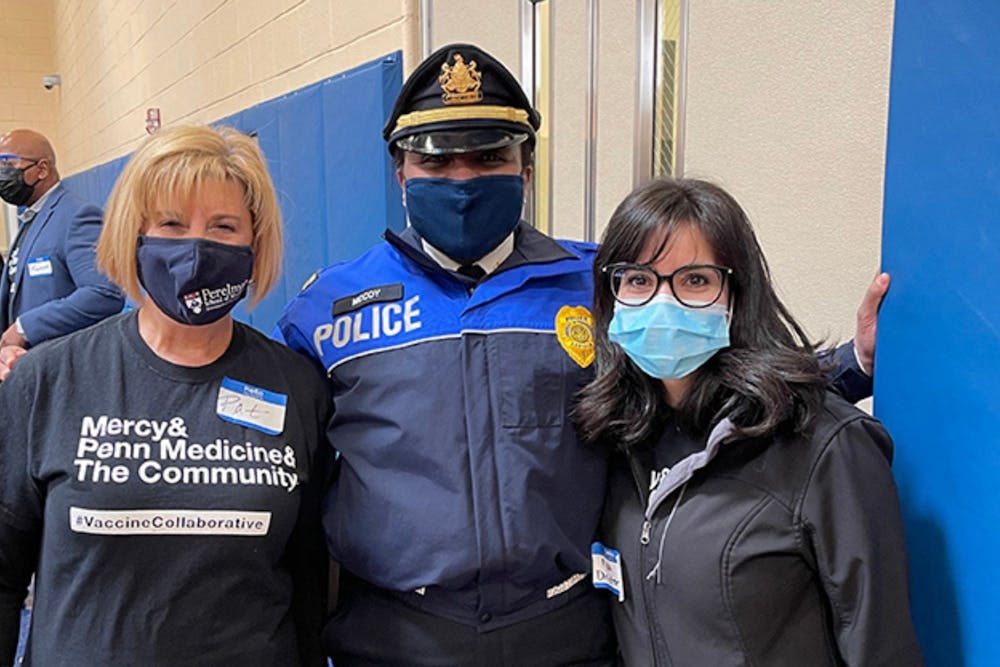
Nicole McCoy (center) is the Division of Public Safety’s first commanding officer of diversity, equity, and inclusion. (Photo from @PennDPS Twitter)
The Division of Public Safety's first commanding officer of diversity, equity, and inclusion Nicole McCoy aims to increase transparency about the Penn Police Department and build more trust between Penn Police and the student community — particularly those from underrepresented backgrounds.
Vice President for Public Safety and Superintendent of Penn Police Maureen Rush appointed McCoy, who began working for the Penn Police Department in 2002, to the position and also promoted her to captain in January 2021. Rush said that the position was created to have a central office dedicated to responding to the needs of minority groups on Penn’s campus.
Rush added that the decision to promote her was because McCoy, a West Philadelphia native, has an intimate knowledge of the surrounding West Philadelphia community, and because she admires the work McCoy has accomplished in her career thus far.
“I picked her because of what she’s done in the community throughout the years," Rush said.
McCoy said that as a Black woman, she experiences the same racism and discrimination as other Black students and West Philadelphians, making her well-equipped to respond to the needs of the community.
Since her appointment, McCoy said she has been working with the University’s cultural resource centers like Makuu: The Black Cultural Center to hire new police officers that can better serve the needs of students from underrepresented backgrounds. She added that she is communicating with students, especially students of color, on how to report any potentially harmful encounters with the Penn Police, which she said is part of a larger process of building trust with students who may not be favorable toward Penn Police.
McCoy said that students often express that they do not know the proper method to report a police complaint, and explained that students can either file a report directly through a police complaint form on DPS' website, or by talking to a Penn faculty or staff member who can then report the incident to Penn Police on the student’s behalf.
“I’m making sure that everyone who interacts with students knows what to do when they hear these stories,” McCoy said.
Another one of McCoy's objectives that she has been working on is updating the hiring process for new Penn Police officers, she said, which will soon involve the cultural resource centers and student leaders from the University’s 6B minority coalition groups as a way to better represent and respond to the voices of students from underrepresented groups on campus. She said that one part of the hiring interview process involves asking potential officers how they would respond if their partner on duty did something harmful toward a citizen, such as racial profiling or excessive force, emphasizing the importance of reporting any inappropriate activity.
“We’re hiring people you’d want responding to your family,” McCoy said.
In addition to being able to report police officers, Rush said that officers are given mandatory diversity and use of force trainings annually.
In addition to her role at Penn, McCoy also works with surrounding neighborhoods by attending monthly meetings with West Philadelphia residents and interacting with the Philadelphia School District to hear the needs of local residents in regard to policing and safety.
McCoy said that although she loves getting to interact with the community she grew up in, some Penn students have been apprehensive in starting dialogues with her about the intersection between policing and race. Some students believe she is a “smokescreen” to distract from larger issues, she said. But she emphasized that when these students are ready to have these conversations, she will be there to listen.
“It’s an uphill battle,” McCoy said. “In the beginning, they won’t want to hear me out, but eventually they’ll want to talk.”
Given recent national incidents, such as the ongoing trial of police officer Derek Chauvin for the police killing of George Floyd, McCoy and Rush both said that they have already implemented, and will continue to implement measures to ensure that incidents of excessive force do not happen within the Penn Police.
"We see things like [the killing of] George Floyd and we make sure that type of person isn't here," Rush said. "I've never seen incidents like these, and we don't accept that kind of behavior here."
Rush said she has also been improving the culture within the Penn Police by meeting personally with every officer of color to make sure they feel comfortable within the force and ensure that any discomfort is addressed.
McCoy added that many officers at Penn Police are seen as solely police officers, and not as members of the West Philadelphia community.
“We're holding roundtables with students so people can know us as people, not just cops,” McCoy said. “I’ve been on this campus since I was born, and I want students to know that we’re here to listen to them.”
The Daily Pennsylvanian is an independent, student-run newspaper. Please consider making a donation to support the coverage that shapes the University. Your generosity ensures a future of strong journalism at Penn.
Donate







